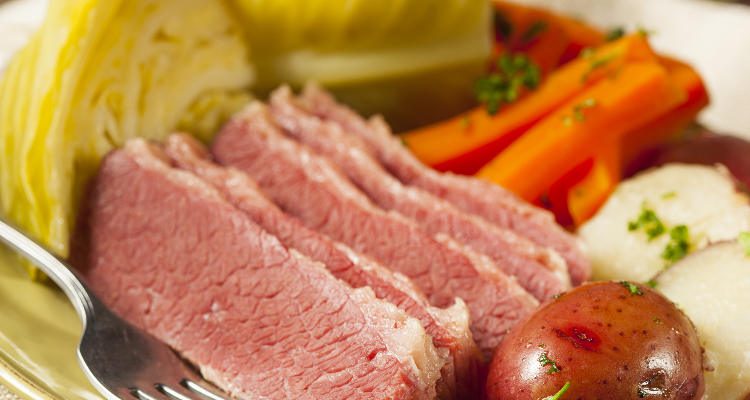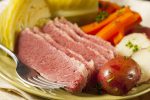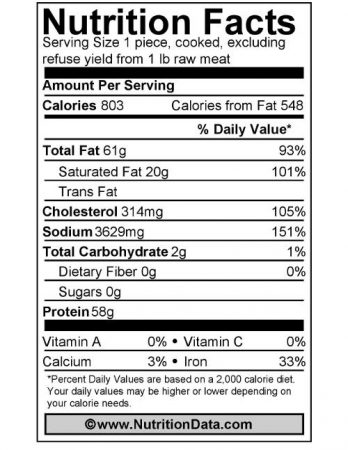
St. Patrick’s Day 2017 is here, and it’s the perfect time to devour a traditional meal of corned beef with some cabbage on the side. But is corned beef healthy for you? Is corned beef gluten-free? In this article, we will answer those questions, and also include a delicious, easy-to-make corned beef recipe to try at home. But first, let’s know a little history about how this day came to be.
History of St. Patrick’s Day
St. Patrick’s Day is celebrated on Match 17 every year to commemorate the death of Saint Patrick. Although the annual religious celebration falls during Lent, Christians around the world take a day off from fasting and celebrate St. Patrick’s Day Irish-style with rich food, laughter, and of course, all things green (including green beer).
A fun fact about St. Patrick’s Day is that the festival didn’t originate in Ireland in spite of having a deep Irish influence. As a matter of fact, it was first celebrated in the United States by Irish immigrants, of course. The traditional St. Patrick’s Day meal of corned beef and cabbage also has a rather fortuitous role in the festival.
Back in the 17th century, beef was considered a luxury meat in Ireland. It wasn’t readily available to everyone. So, when the Irish immigrants arrived on American soil, they found beef to be an accessible meal. Sharing close proximity with the Jewish communities in the United States, the Irish took up eating corned beef with cabbage and boiled root vegetables like carrot, turnip, and potato.
As a result, corned beef and cabbage became a popular meal with the Irish, and it found an honorable place in the annual religious celebration. But is corned beef healthy for you? To answer this, we need to take a look at its nutritional content.
Corned Beef Nutrition Facts
So, how healthy and nutritious is corned beef? To begin with, corned beef is low in calories but high in fat, and is an excellent source of protein, vitamins, and minerals. A serving of 320 grams of corned beef contains 87% of vitamin B12, 48% of niacin, 37% of vitamin B6, and 32% of riboflavin. It also has a considerable amount of vitamin K, folate, and thiamin. It is rich in essential minerals like zinc, iron, phosphorus, selenium, and copper. Corned beef has no dietary fiber, and about 101% DV (Daily Value) of saturated fat per 320 grams.
An average serving of corned beef has 30% of the recommended daily intake of cholesterol according to the American Heart Association (AHA). In addition, corned beef contains 16 grams of fat and 5 grams of saturated fat, which equals to 25% and 35%, respectively, according to the AHA’s total daily consumption of fats for healthy people. With 960 milligrams of sodium, corned beef can potentially spike blood pressure levels. A single serving of corned beef contains 40% of the AHA guidelines for the total daily consumption of sodium.
Credit: Nutrition Data/Corned Beef
Is Corned Beef Healthy?
Generally speaking, red meat like corned beef isn’t quite healthy, nor is it gluten-free. It contains high amounts of saturated fat, cholesterol, and sodium—all of which are not good for heart health and blood pressure. Furthermore, commercially-produced corned beef is cured with sodium nitrite to maintain the color and flavor of the meat, while impeding bacterial growth. Corned beef is also cooked at high temperatures, and this causes the nitrates break down to form nitrosamines. Some researchers are of the opinion that nitrosamines could be carcinogenic to humans in adequate concentrations.
Nevertheless, there’s a bright side to eating corned beef as well. Corned beef contains a good amount of essential nutrients besides being risky for people with health issues. It is a good source of protein, zinc, iron, and vitamin B complex. These nutrients are useful in maintaining and performing vital organ functions.
Corned beef also contains zinc, which helps to heal wounds and acne quickly, maintains proper functioning of the immune and digestive systems, improves metabolism, and controls diabetes and stress levels. The iron content plays a role in the proper absorption of oxygen in the blood and produces hemoglobin. It also prevents and treats anemia and fatigue.
Antioxidants like selenium are also found in considerable amounts in corned beef. The selenium in it has anti-inflammatory properties, promotes good heart health, and can reduce oxidative stress. With 40% DV of phosphorus and 3% DV of calcium, corned beef also contributes to overall bone and teeth health.
Therefore, we can conclude that eating corned beef sporadically will not cause any major heath hazards. However, people with heart issues and other medical conditions should refrain from eating it, or at least consult a physician prior to consumption.
Easy Homemade Corned Beef Recipe
Corned beef has a unique taste due to a combination of spices and a brine solution used to flavor it. So, what spices are in corned beef? The recipe calls for a pickling spice that includes black peppercorns, mustard seeds, mace, cinnamon, and coriander seeds, among others. Here is a simple corned beef recipe to cook at home.
Ingredients
For the pickling spice:
2 tablespoons of black peppercorns, 2 tablespoons of mustard seeds, 2 tablespoons of coriander seeds, 2 tablespoons of crushed red pepper flakes, 2 tablespoons of allspice berries, 1 tablespoon of ground mace, 2 small cinnamon sticks, crushed or broken into pieces, 2 to 4 bay leaves, crumbled, 2 tablespoons of whole cloves and 1 tablespoon of ground ginger.
For the brine solution:
1 gallon of water, 2 cups of kosher salt, ½ cup of granulated sugar, 1 ounce (5 teaspoons) pink salt, 3 garlic cloves, minced, 2 tablespoons pickling spice (see above or use store-bought), 1 5-pound well-marbled (first-cut) beef brisket
Directions
To make the pickling spice, roast the peppercorns, mustard seeds, and coriander seeds over medium heat. Next, grind them carefully. Put them in a glass jar and add the other ingredients, too. Mix them thoroughly and cover them tightly.
To make the brine solution, add water, salt, sugar, pink salt, garlic, and two tablespoons of pickling spice into a large pot. Boil the ingredients until salt and sugar dissolve. Let it cool and chill it in the refrigerator.
Put the brisket in the chilled brine (it should be submerged completely). Refrigerate it for five days and then remove the brisket from the brine solution. Rinse the brine off the surface of the brisket.
To cook the corned beef, place the brisket in a large pot and add water to cover the entire brisket. Add two tablespoons of pickling spice and boil it. Let it simmer for three hours, until tender.
When done, remove it from the cooking liquid. Nicely slice up the corned beef, and serve warm or cool. You can store the brisket up to a week in the refrigerator.
You can also use the cooking liquid as a garnish if serving the corned beef with vegetables.
Related:
Sources:
“Beef, cured, corned beef, brisket, cooked Nutrition Facts & Calories,” SELF NutritionData; http://nutritiondata.self.com/facts/beef-products/3488/2, last accessed March 16, 2017
“3 Great Health Benefits Of Corned Beef,” Kreier Kountry POA Farm, June 17, 2015; http://kreierkountrypoafarm.com/2015/06/17/3-great-health-benefits-of-corned-beef/, last accessed March 16, 2017














